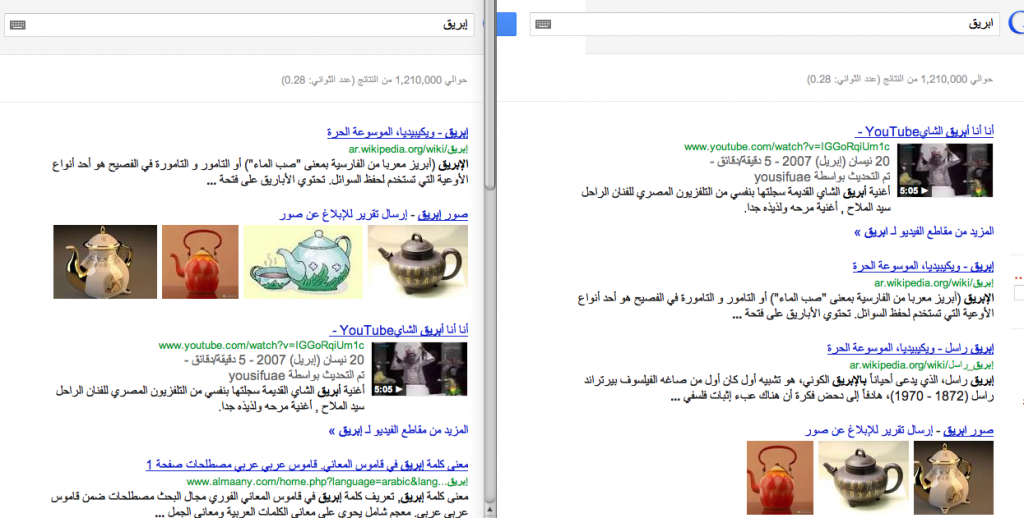
Those familiar with the Arabic language know that there are often slight variations in the way words can be spelled in Arabic. This is true more of foreign words or names like “Google” which can be spelled “قوقل” or “غوغل” or “جوجل” . However, it is also common for there to be slight differences in the way an Arabic word can be written. Sometimes this stems from slight dialectical differences between countries or the use of slang but it can also stem from writing a word in a more informal way.
The important question is does Google differentiate between these alternate spellings of a word? In short the answer is clear “Yes”. Let’s examine this further.
Though I am sure there are many different examples of how alternate spellings of an Arabic keyword can affect search results I will focus on one of the most common ways in this post. The example I will focus on in this post will center around the letter أ (alef) and how the use of it can affect search results.
The case of the kettle
The word I will use as an example is إبريق (kettle) which can be written a couple of different ways. The most correct way to write it is with a ء(hamza) under the ا (alef) but often the ء (hamza) is left out all together because it is easier to write without it. Examine the search results below.
Though it is clear from these search results that the intended meaning of both spellings of the word is the same the search results are actually significantly different from each other. Yes, many of the sites that appear are in the top five positions are the same but the order is clearly different. The more simple spelling of the word has the Youtube result in the top position instead of the third position. The simplified query also has two Wikipedia results in the top five positions while the more correct spelling has just one. Even the image results that show up are different. The last five positions on the two results pages are also significantly different. What about search volume. Does the Google keyword tool see these as two different keywords with different search volume?
From looking at the snapshot above it is clear that Google does in fact treat these two versions of the keyword as two distinct keywords as well. In fact the search volume for the simple version of the keyword is 3-4 times higher than the search volume of the more accurately written version the keyword. Clearly, at present, Google and possibly other search engines have trouble understanding that these two queries and others like them are one in the same.
If you were in the business of selling kettles online in Arabic speaking countries the fact that these two queries show different results could be very important to you. You wouldn’t just want to rank for the most accurate version of the keyword but also for the simpler version that has the higher traffic numbers.
Implications for Arabic SEO
In light of the fact that different versions of a keyword can produce different search results pages and the fact that those versions can have different levels of traffic it is important you consider how you optimize for a these types of keywords as part of you SEO strategy. Here are a couple of pointers for these situations.
Think about all the ways a keyword can be written
Consider if a keyword in Arabic can be written in more than one way. Do your research both by looking at the search results and by using keyword tools like was done in the kettle example above. If a keyword clearly has alternative versions that impact the search results contemplate how you might optimize for both variations.
Optimizing for a less accurate or less formal version of a keyword
Given that one version of a keyword may be less grammatically correct than another it will be harder to optimize for it. If you have a professional website you will probably have pressure on you to make sure your content is well written and as grammatically accurate as possible. This however doesn’t mean the less correct version should be neglected. Below are some thoughts on how you might be able to show Google that your site is relevant for both versions of the keyword given other limitations.
Optimize using the less formal areas of your site
Use less formal areas of your site to optimize for the less grammatically correct keyword. One area this is possible is within the comments on a page. People generally consider comments to be informal in their nature and therefore people feel more comfortable not always using proper grammar when writing comments. In your responses you can use the informal version of the keyword. In fact you may find that site visitors might naturally use the informal version of the keyword in their comments unintentionally. This same principle is true for onsite reviews and forums if you have them sections on your site as well.
Optimize using the less formal areas of other sites
Just like with informal areas of your own site you can use informal areas of other sites like industry forums, review sites, and Q&A sites to link back to your site. You can accomplish this by linking back to your site using the informal keyword in the context surrounding the link or within the anchor text of the link itself.
Use social media sites to optimize
Another thing that could possibly help is linking to your site on popular social media sites using the less formal version of the keyword. Though sites like Twitter no follow Tweet links and post links, it is possible Google could still use this signal and even if it doesn’t you might get someone to link to you using the same wording you used in your post or your Tweet.
Utilize image alt texts
Image alt texts and file names can also be a good place to insert the less formal version of your targeted keyword. End users typically don’t see alt texts or image files names unless they are using a screen reader but search engines do see these page elements. Many websites on the Internet don’t put much thought into alt texts on images regardless so using a less formal version of a word as an alt text shouldn’t raise any red flags. As an added benefit you might find that images will also show up in the search results for your target keyword, which could result additional traffic to your website.
So in summary how you optimize for an Arabic keyword that can be spelled in different ways can greatly affect where you rank and how much keyword traffic you get. Google will probably get savvier about these kinds of situations in the future but for now it is important to take this reality into account as you optimize your site in Arabic.
Source: http://istizada.com/blog/arabic-keyword-spelling-affects-google-results-traffic-potential/



 MEWS is a full service web development Internet marketing company and technology integrator founded in 2003, by leading industry consultants with previous technology experience.MEWS is an Internet services and solutions company with interests in website development – Mobile applications– domain name registrations - web hosting.
MEWS is a full service web development Internet marketing company and technology integrator founded in 2003, by leading industry consultants with previous technology experience.MEWS is an Internet services and solutions company with interests in website development – Mobile applications– domain name registrations - web hosting.